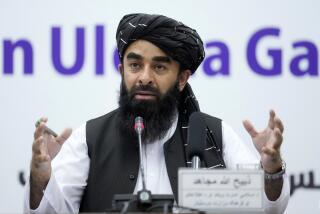Suicide bomber kills deputy governor in Afghanistan
Reporting from Kabul, Afghanistan — A motorcycle-borne suicide bomber killed the deputy governor of strategic Kandahar province Saturday, raising fears that insurgents were reigniting a campaign of assassinations of public servants that terrorized the south’s main urban hub for much of last year.
The Taliban claimed responsibility for the attack, which killed Abdul Latif Ashna and injured three of his bodyguards as he was driving to work in Kandahar city. It was the highest-profile strike of its kind in months.
A wave of political assassinations in and around Kandahar -- including that of the city’s deputy mayor last April as he prayed in a mosque, and his successor, six months later -- spiked in the spring and summer of 2010. But the killings had subsided in recent months as NATO and Afghan forces consolidated their grip on several key districts surrounding the city.
Western military officials hope that improving security in the province, the traditional heartland of the Taliban, will pave the way for better governance and public services, and in turn help build backing for the beleaguered administration of President Hamid Karzai while sapping support for the insurgency. But the insurgents’ killing of public officials, tribal elders and other influential figures undermines that goal.
Karzai condemned the attack, as did U.S. Ambassador Karl W. Eikenberry and the NATO force. Eikenberry, offering condolences while on a visit to the province, called it a “vicious assassination” and a setback to efforts to stabilize Kandahar.
U.S. military officials say their operations in Kandahar are pivotal to the overall war effort, now in its 10th year. Much of last year’s troop surge, which brought American forces in the country to 100,000, was centered in Kandahar and neighboring Helmand province. Last year was the deadliest of the war to date for U.S. and other Western troops, with the spike in casualties attributed to grappling with the Taliban movement on its home turf.
Senior Western commanders have acknowledged that it will not be known until spring whether U.S.-led forces will be able to consolidate what they described as significant and hard-fought military gains in three districts surrounding Kandahar city.
Taliban fighters usually use the winter months to rest and regroup across the border in Pakistan, but U.S. commanders say the insurgency has been considerably weakened by targeted strikes, mainly carried out by special operations forces, which have decimated movement’s midlevel field command. Even so, the Taliban last year made inroads in some previously calm areas of the country, and the movement’s leaders have rebuffed efforts to bring them to the bargaining table.
More to Read
Sign up for Essential California
The most important California stories and recommendations in your inbox every morning.
You may occasionally receive promotional content from the Los Angeles Times.










